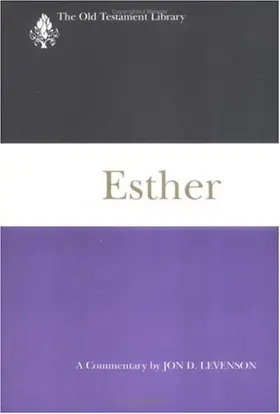

Esther
Pages
142
Publisher
Westminster John Knox
Published
1/1/1997
ISBN-13
9780664220938
Collections
This book appears in the following featured collections.
- Favorite Advanced OT Commentaries by Jeremy Pierce (parableman)
- Top Old Testament Commentaries by Engaging Scripture (Nijay Gupta's Substack)
- Commentaries by Jewish Scholars by Matt Quintana
- TGC: Scholarly Commentaries by The Gospel Coalition
Reviews
Levenson’s work is more readable than Bush’s. It considers Esther’s place in the canon and issues of authorship. Longman says, “[Levenson] is well versed in the ancient and modern scholarly literature. It also pays attention to the Greek version of the story that is significantly different from the Hebrew version and that is accepted by Catholics as authoritative. Levenson believes that Esther seems well aware of authentic Persian customs and history, but in the final analysis he believes it is a work of historical fiction.”
[Full Review]
After a succinct introduction addressing key aspects of the book of Esther, the commentary section includes the Septuagint version of Esther. The literary structure of Esther (Figure 2, p. 8) has shaped later commentators’ interpretation of the book. I also like the theological insights of this commentary.
[Full Review]
Outstanding critical scholarship, written by a Jewish scholar for a broader audience. Incorporates comments on LXX portions not in the MT, as well as attention paid to AT and proto-Esther, giving a more rounded view of the reception and redaction history and not just the final form of the MT. Engaging, astute, and keenly attentive to literary nuance and storytelling methods. Scholarly, but not inaccessible.
incorporates rabbinic
material in addition to standard historical-critical words
A master of biblical theology from a Jewish perspective examines the book of Esther.
[Full Review]
Jon Levenson’s new commentary on the book of Esther is an excellent addition to the Old Testament Library series. Highly erudite yet accessible, this commentary belongs on the shelves of students, clergy, and professional scholars as well as the serious layperson. Like other volumes in the series, Esther: A Commentary begins with an introduction that discusses the standard issues of biblical commentary: plot, structure and style, historicity and date of composition, and versions. Because Esther is a short story or novella, Levenson is particularly concerned with structure and style, discussing at length the structuring motif of banquets, the symmetry of the plot surrounding the pivotal scene of Mordecai’s rise and Haman’s fall in chapter 6, the literary style of the author, and the comic elements present in the book. When Levenson notices the humorous moments in Esther, his own dry sense of humor peeps through; for example, in the midst of an explanation of Ahasuerus’s decree that all the virgins in the empire be gathered into his harem, Levenson notes “celibacy not being Ahasuerus’ forte . . .” (p. 2). Levenson’s own clarity of style and gentle wit makes the book a pleasure to read from beginning to end. Since the versions of the book of Esther pose particular problems of interpretation, Levenson also spends considerable time exploring the differences between the Masoretic Text, the Septuagint, and the Greek Alpha Text. He reaches the conclusion that MT Esther and AT Esther both descend from a hypothetical Hebrew proto-Esther, while the Septuagint is an expanded and reshaped translation of the MT. In this he finds himself in agreement with the majority of Esther scholars today.
[Full Review]





